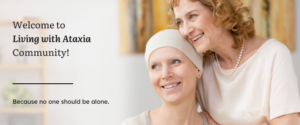
The word “ataxia”, comes from the Greek word, ” a taxis” meaning “without order or incoordination”. The word ataxia means without coordination. People with ataxia have problems with coordination because parts of the nervous system that control movement and balance are affected. Ataxia may affect the fingers, hands, arms, legs, body, speech, and eye movements. Ataxia is often used to describe a symptom of incoordination which can be associated with infections, injuries, other diseases, or degenerative changes in the central nervous system.
This patient support site is a virtual community intended to be a safe place for patients and family members as young as age 12, to visit for information, discussion, venting and mutual support. Members come from many backgrounds. Some have a strong religious faith, and others no faith; some are children and others adults, rich and poor, graduate educated or taught by life. Our common denominators are that we share a life journey, and we try to help each other.
How is Ben’s Friends Different from Social Media and Other Support Sites?
Our mission at Ben’s Friends is to ensure that patients living with rare diseases or chronic illnesses, as well as their caregivers, family, and friends, have a safe and supportive place to connect with others like them.
We’re interested in you as a person, and in your struggles as a rare disease patient. But we don’t want to know your name or where you live. We won’t even allow you to use your real name when you register for one of our communities. Because when it comes to medical things, anonymity is important in our googly universe. Your information is never shared, and your activity never tracked by adware.
When Ben’s Friends asks for the country and region you live in, that’s in case your fellow members can recommend local resources and help, and so everyone knows what kind of medical system there is where you live. That’s important when it comes to giving and getting support. Because we are all about support, and we’re all in this together..
Ben’s Friends: Safe and Supportive.
And anonymous to keep it that way.
Why create an account?
Posts on the different Ben’s Friends communities can be read by anyone on the internet. You can browse through the different topics and find most of the information you’re looking for but there are many things you won’t be able to do unless you create an account. These include:
Making your own posts. Although you’re able to find useful information just by reading other members’ posts, you might still have a lot of questions in your mind. Either you want to start a new topic to talk about them in detail or you want to reply to a comment on a thread. These won’t be possible unless you create a new user account.
Viewing other members’ profiles. Member profiles include information about the country or region they are from, whether they are a patient or a caregiver, and details about their disease and treatments. Maybe you came across an interesting post and you want to learn more about the member. Or maybe you’re looking for members who are from the same country as you. Having a user account allows you to see other member profiles and find information that may be relevant.
Sending private messages. Aside from being able to post publicly and commenting on a thread, having a user account also allows you to send private messages both to other members and moderators. In case you want to discuss a topic only with a specific person, this is possible by sending private messages when you have created your account.
Click here to create an account and join.
Latest Discussion
- The Vestibular System…in addition to Ataxiaby Beryl_Park on February 21, 2026
I cope with these symptoms….a diagnosis of ataxia doesn’t just refer to mobility issues. 1 post - 1 participant Read full topic
- 18-24 ataxia support group | Facebookby Breanna on February 4, 2026
If you are older, please consider joining The Dominoes Support Group for Adults 25-35 Living with Ataxia or Age 30-55 with Ataxia Support Group facebook.com 18-24 ataxia support group | Facebook This is a group where we can discuss how we cope with our ataxia and support each other in any stage we are going […]
- Happy New Yearby Chas521 on January 1, 2026
Happy New Year to all! 2 posts - 2 participants Read full topic
- Healthy gut supports brainby Chas521 on December 16, 2025
brainandlife.org The Gut-Brain Connection: Why a Healthy Microbiome Is Key to Disease Prevention Emerging research shows that taking care of your gut microbiome through diet, supplements, and lifestyle may help prevent chronic diseases and support cognitive well-being. 1 post - 1 participant […]
- Brain and Life magazineby Chas521 on December 11, 2025
I received an email tonight from Brain and Life magazine today that they are not publishing the paper magazine anymore but are going online only.! 1 post - 1 participant Read full topic






